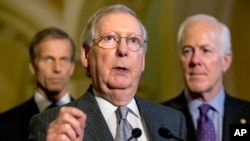The Republican-led U.S. Senate rejected the centerpieces of President Barack Obama’s environmental agenda less than two weeks before the start of a U.N. climate change conference in Paris.
The Senate passed a resolution disapproving the president’s Clean Power Plan, and another disapproving limits on carbon emissions from U.S. power plants. Neither is likely to have much practical effect.
“The Obama administration is trying to impose deeply regressive energy regulations that would eliminate good paying jobs,” said Majority Leader Mitch McConnell, who represents coal-rich Kentucky.
“If the administration’s Clean Power Plan moves forward, hardship will be felt all across the country,” said Republican Shelley Moore Capito of West Virginia, another coal producing state. “Fewer job opportunities, higher power bills and less reliable electricity will result.”
Democrats countered that the health and well-being of Americans and humanity as a whole are at stake.
“We’re here to protect lives. We’re here to protect the planet,” said Senator Barbara Boxer of California.
The Clean Power Plan aims to dramatically boost U.S. energy production from wind, solar and other “green” sources and, over time, reduce the nation’s reliance on carbon-based power.
Backers say nixing the plan could torpedo hopes for a global commitment to fight climate change at the Paris conference.
“We are one of the biggest emitters of carbon dioxide on the planet,” said Democrat Tom Carper of Delaware. “We need to lead by our example. It’s not ‘do what we say’ but rather ‘do what we do.’”
The issue is not strictly partisan. Several Democrats from coal and natural gas producing states have joined Republicans in opposing the Obama administration’s efforts to curb greenhouse gas emissions.
With bipartisan backing, the resolutions of disapproval had ample support to clear the Senate with simple majority votes. The House of Representatives is expected to approve identical measures, meaning the resolutions are all but certain to reach Obama’s desk.
But presidential vetoes also are a foregone conclusion, and neither chamber has the two-thirds backing that would be required to override them.
Given that reality, some Democrats questioned the rationale and the timing of the resolutions.
“Paris is still recovering from the terrorist attacks. The appropriations bills that would fund our FBI and Homeland Security are bottled up,” said Senator Sheldon Whitehouse of Rhode Island. “And the majority leader wants to spend his floor time serving the coal industry.”
“Affordable energy matters,” countered Capito. “Renewable [energy] sources are an important part of our country’s energy mix. But there are always going to be days when the wind just isn’t blowing and the sun just isn’t shining.”
The annual U.N. climate conference begins November 30 in Paris and will bring together representatives of nearly 200 nations. The gathering aims to produce a universal and legally binding accord to reduce global carbon emissions and slow the warming of the planet.




